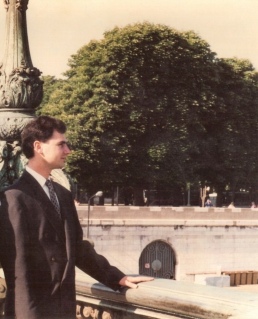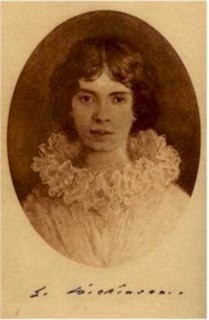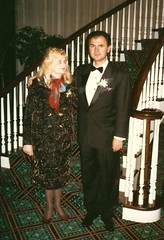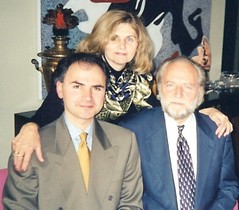Blog Archives
Waiting for the Barbarians By Constantine Cavafy
Translated by Edmund Keeley
What are we waiting for, assembled in the forum?
The barbarians are due here today.
Why isn’t anything happening in the senate?
Why do the senators sit there without legislating?
Because the barbarians are coming today.
What laws can the senators make now?
Once the barbarians are here, they’ll do the legislating.
Why did our emperor get up so early,
and why is he sitting at the city’s main gate
on his throne, in state, wearing the crown?
Because the barbarians are coming today
and the emperor is waiting to receive their leader.
He has even prepared a scroll to give him,
replete with titles, with imposing names.
Why have our two consuls and praetors come out today
wearing their embroidered, their scarlet togas?
Why have they put on bracelets with so many amethysts,
and rings sparkling with magnificent emeralds?
Why are they carrying elegant canes
beautifully worked in silver and gold?
Because the barbarians are coming today
and things like that dazzle the barbarians.
Why don’t our distinguished orators come forward as usual
to make their speeches, say what they have to say?
Because the barbarians are coming today
and they’re bored by rhetoric and public speaking.
Why this sudden restlessness, this confusion?
(How serious people’s faces have become.)
Why are the streets and squares emptying so rapidly,
everyone going home so lost in thought?
Because night has fallen and the barbarians have not come.
And some who have just returned from the border say
there are no barbarians any longer.
And now, what’s going to happen to us without barbarians?
They were, those people, a kind of solution.
 |
| Constantine Cavafy (1864-1933) |
Ithaca by Constantine P. Cavafy
 |
| Constantine Cavafy c.1900 |
When you set out on your journey to Ithaca,
pray that the road is long,
full of adventure, full of knowledge.
The Lestrygonians and the Cyclops,
the angry Poseidon — do not fear them:
You will never find such as these on your path,
if your thoughts remain lofty, if a fine
emotion touches your spirit and your body.
The Lestrygonians and the Cyclops,
the fierce Poseidon you will never encounter,
if you do not carry them within your soul,
if your soul does not set them up before you.
Pray that the road is long.
That the summer mornings are many, when,
with such pleasure, with such joy
you will enter ports seen for the first time;
stop at Phoenician markets,
and purchase fine merchandise,
mother-of-pearl and coral, amber and ebony,
and sensual perfumes of all kinds,
as many sensual perfumes as you can;
visit many Egyptian cities,
to learn and learn from scholars.
Always keep Ithaca in your mind.
To arrive there is your ultimate goal.
But do not hurry the voyage at all.
It is better to let it last for many years;
and to anchor at the island when you are old,
rich with all you have gained on the way,
not expecting that Ithaca will offer you riches.
Ithaca has given you the beautiful voyage.
Without her you would have never set out on the road.
She has nothing more to give you.
And if you find her poor, Ithaca has not deceived you.
Wise as you have become, with so much experience,
you must already have understood what Ithacas mean.
(1911)
The Spaces of Hope by Ivan V. Lalic
I have experienced the spaces of hope,
The spaces of a moderate mercy. Experienced
The places which suddenly set
Into a random form: a lilac garden,
A street in Florence, a morning room,
A sea smeared with silver before the storm,
Or a starless night lit only
By a book on the table. The spaces of hope
Are in time, not linked into
A system of miracles, nor into a unity;
They merely exist. As in Kanfanar,
At the station; wind in a wild vine
A quarter-century ago: one space of hope.
Another, set somewhere in the future,
Is already destroying the void around it,
Unclear but real. Probable.
In the spaces of hope light grows,
Free of charge, and voices are clearer,
Death has a beautiful shadow, the lilac blooms later,
But for that it looks like its first-ever flower.
 |
| Ivan V. Lalic |
A Forgetful Number by Vasko Popa
Pure and round like the sun
But alone very much alone
It began to reckon with itself
It divided multiplied itself
It subtracted added itself
And remained always alone
It stopped reckoning with itself
And shut itself up in its round
And sunny purity
Outside were left the fiery
Traces of its reckoning
They began to chase each other through the dark
To divide when they should have multiplied themselves
To subtract when they should have added themselves
That’s what happens in the dark
And there was no one to ask it
To stop the traces
And to rub them out.
 |
| Vasko Popa (1922-1991) |
A Dog Has Died by Pablo Neruda
Zone by Guillaume Apollinaire
You are weary at last of this ancient world
Shepherdess O Eiffel tower whose flock of bridges bleats at the morning
You have lived long enough with Greek and Roman antiquity
Here even automobiles look old
Only religion stays news religion
As simple as hangars at the airfield
Alone in Europe you Christianity are not antique
The one modern European is you Pope Pius X
And you whom windows watch what shame keeps you
From entering a church and confessing your sins this morning
Handbills catalogues advertisements that sing overhead
Furnish your morning’s poetry for prose there are newspapers
Dime detective novels packed with adventure
Biographies of great men a thousand and one titles
This morning I saw a fine street whose name slips my mind
New and bright the sun’s clarion
Where executives and workers sweet stenographers
Hurry every weekday dawn and dusk
Three times a morning sirens groan
A choleric bell barks at noon
Billboards posters and
Doorplates twitter like parakeets
There is charm to this Paris factory street
Between rue Aumont-Thiéville and the avenue des Ternes
Here is the young street and you still a baby
Dressed by your mother only in blue and white
A pious child with your oldest friend René Dalize
You like nothing so much as church ceremonies
Nine o’clock the gas turns blue you slip out of bed
To pray all night in the school chapel
While an eternal adorable amethyst depth
Christ’s flaming halo revolves forever
He is the lovely lily we all worship
He is the red-haired torch no wind may blow out
Pale and scarlet son of the sorrowful mother
Tree hung with prayer
Twofold gallows of honor and eternity
Six-pointed star
God who dies Friday and rises on Sunday
Christ who flies higher than the aviators
And holds the world’s record
Christ pupil of the eye
Twentieth pupil of the centuries he knows his business
And changed to a bird this century ascends like Jesus
Devils in hell raise their heads to stare
They say it imitates Simon Magus in Judea
They say if it lifts to call it a lifter
Angels soar past the young trapeze artist
Icarus Enoch Elijah Apollonius of Tyana
Hover near the original airplane
Or give place to those whom the Eucharist elevates
Priests rising continuously as they raise the Host
At last the plane lands with wings outspread
Through heaven come flying a million swallows
At full speed crows owls falcons
Ibises flamingoes storks from Africa
Roc so celebrated in song and story
Clutching Adam’s skull the original head
Eagle from the horizon pounces screaming
Hummingbird arrives from America
From China long supple phis
Who have only one wing and fly in couples
Here comes the dove immaculate spirit
Escorted by lyrebird and ocellated peacock
That funeral pyre the phoenix engendering himself
Momentarily veils all with his ardent ash
Sirens quit their perilous perches
And arrive each singing beautifully
Everyone eagle phoenix phis
Fraternizes with the flying machine
Now you stride alone through the Paris crowds
Busses in bellowing herds roll by
Anguish clutches your throat
As if you would never again be loved
In the old days you would have turned monk
With shame you catch yourself praying
And jeer your laughter crackles like hellfire
Its sparks gild the depths of your life
Which like a painting in a dark museum
You approach sometimes to peer at closely
Today in Paris the women are bloodstained
It was as I would rather forget it was during beauty’s decline
From fervent flames Our Lady gazed down on me in Chartres
Your Sacred Heart’s blood drowned me in Montmartre
I am sick of hearing blessed words
My love is a shameful disease
You are sleepless anguished but possessed by an image
Which hovers never distant
By the Mediterranean
Under lemon trees that flower the year long
You take ship with friends
One from Nice one from Menton two from La Turbie
Terrified we see in the depths giant squid
And fish the Savior’s symbols gliding through seaweed
In a tavern garden near Prague
You are content instead of writing your stories
To watch a rose on the table and
A rosebug asleep in the rose’s heart
Agahst you trace your likeness in the mosaics at Saint Vitus
And that day almost died of grief to see yourself portrayed
As Lazarus distracted by daylight
The hands of the ghetto clock run backward
You also creep slowly backward through life
Climbing to the hradchen listening at twilight
To Czech songs from the taverns
You in Marseilles among piles of watermelons
You in Coblenz at the Giant’s hotel
In Rome sitting under a Japanese medlar tree
In Amsterdam with a girl you find pretty but who is ugly
And engaged to a student from Leyden
One can rent rooms there in Latin Cubicula locanda
I remember three days there and three at Gouda
You are in Paris arrainged before the judge
Arrested like a criminal
You went on sad and merry journeys
Before growing aware of lies and old age
Love made you unhappy at twenty again at thirty
I have lived like a fool and wasted my youth
You no longer dare examine your hands and at any moment I could weep
Over you over her whom I love over all that has frightened you
With tears in your eyes you see the shabby refugees
Who have faith in God and pray the mothers nurse their children
Their smell fills the waiting room at the gare St. Lazare
Like the three kings they believe in a star
Hoping to strike it rich in Argentina
And return home wealthy
One family carries a crimson quilt as you your heart
Quilt and our dreams are equally unreal
Some of these refugees stay on and lodge
In slums on the rue des Rosiers or the rue des Écouffes
They keep close to home like chessmen
And are mostly Jewish their wives wear wigs
Pallid they sit at the back of little shops
You stand at the counter of a dirty bar
Taking a café for two sous among the wretched
You are in a huge restaurant at night
These women are not evil only careworn
Each has tortured her lover even the ugliest
Who is the daughter of a Jersey policeman
Her hands which I had not noticed are calloused and cracked
Pity fills me for the scars on her belly
Now I humble my mouth to a poor creature with a horrible laugh
You are alone morning comes
Milkmen clink bottles along the street
Night leaves like a lovely Métive
Ferdine the false or watchful Lea
You sip a liquor as burning as your life
Your life you drain like an eau-de-vie
And stride home to Auteil
To sleep among your fetish from Oceania or Guinea
Other forms of Christ and other faiths
Lesser Christs of dim aspirations
Farewell Farewell
Sun slit throat

Premonitory Portrait of Guillaume Apollinaire by Giorgio de Chirico, 1914
Sadness and Happiness
By Dejan Stojanovic
I will not be able to say what I really want to say
And I am sad about it
I will not be able to see all I want to see
And I am sad about it
I will not be able to visit even the closest neighbors in the universe
And I am sad about it
I will not be able to read all I want to read
And I am sad about it
I will not be able to love as much as I would want to
And I am sad about it
I will not be loved as much as I would want to
And I am sad about it
But I lived
And I am happy about that
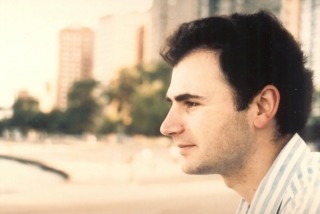 |
| Dejan Stojanovic, Chicago, 1991 |
Being Late by Dejan Stojanovic
In the movement of heavenly bodies derive?
It is precision.
Sun is never late to rise upon the Earth
Moon is never late to cause the tides
Earth is never late to greet the Sun and the Moon
Thus accidents are not accidents
But precise arrivals at the wrong right time
Love is almost never simple
Too often, feelings arrive too soon
Waiting for thoughts that often come too late
I wanted too, to be simple and precise
Like the Sun
Like the Moon
Like the Earth
But the Earth was booked
Billions of years in advance.
Designed to meet all desires,
All arrivals, all sunrises, all sunsets,
All departures
So I will have to be a little bit late.

